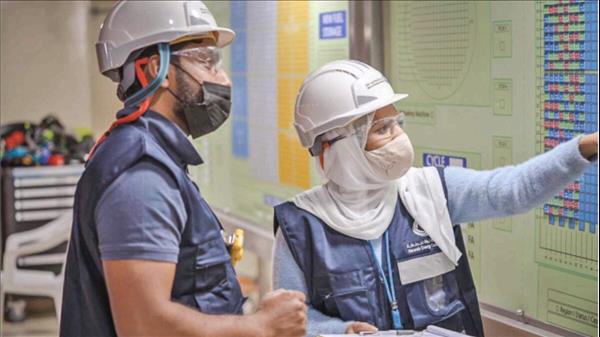(MENAFN- Khaleej Times) The Barakah Nuclear Energy Plant in Abu Dhabi is spearheading efforts towards achieving UAE's Net Zero by 2050 target by preventing millions of tonnes of carbon emissions annually. As of today, the Barakah plant is the largest source of clean electricity in the region and will prevent more carbon emissions than previously expected.
Based on the latest data, the Emirates Nuclear Energy Corporation (Enec) said that the four units of the Barakah plant will prevent 22.4 million tonnes of carbon emissions every year, 6 per cent more than previously forecast.
“The Barakah plant is a sustainable powerhouse for the UAE, leading the largest decarbonisation drive of any industry here locally and in the wider Arab World today, and spearheading the nation's commitment to tackling climate change,” said Mohamed Ibrahim Al Hammadi, managing director and CEO of Enec.
The UAE is recognised as a global nuclear energy success story and an international benchmark in terms of project management and cost-effectiveness.
Recently, the plant's Unit 3 was officially connected to the country's power grid. It achieved start-up in 2022, just one year after the start-up of Unit 2, showing the significant progress being made at the plant – the first multi-unit operational nuclear plant in the Arab world.
ALSO READ:
people's president: viral video of sheikh mohamed hugging barakah nuclear plant workers will make your day
uae launches 11 environmentally-friendly energy projects worth dh159 billion in 2022: suhail al mazrouei
uae taking 'concrete steps' to be among top 10 green hydrogen producers
Unit 3 will start commercial operations in the coming months, while Unit 4 is in the final stages of commissioning.
“Since the start of commercial operations in 2021, Unit 1 has been the largest single electricity generator in the Arab World, completely carbon emissions-free. The UAE's decision to diversify its energy sources to include nuclear is paying dividends today as we work to make the largest contribution to the UAE's Net Zero by 2050 initiative,” said Al Hammadi.
The 22.4 million tonnes prevented by the Barakah plant is equivalent to 4.8 million passenger cars driven for one year. This is based on the updated projections and using new data on vehicle emissions. There are approximately 3.5 million cars on the UAE's road's today, demonstrating the Barakah plant's significant positive impact on the UAE's carbon footprint, rapidly decarbonising the country's energy sector.
According to data from the Emirates Water and Electricity Company (Ewec), carbon emissions are expected to decrease by 50 per cent in 2025 as a result of the Barakah plant being fully operational, as well as the launch of additional large-scale solar power generation and efficient water desalination. In the same year, Barakah will be responsible for producing more than 85 per cent of Abu Dhabi's clean electricity.
It is one of the largest nuclear energy plants in the world, with four APR-1400 units. When fully operational, it will produce 5.6 gigawatts of electricity with zero carbon emissions. It will power up to 570,000 homes as well as support the UAE's strategy for becoming a net-exporter of LNG by 2030 by replacing local gas consumption.
Over the next 60 years, the plant will continue to deliver clean electricity 24/7, contributing significantly to the UAE's Net Zero by 2050 initiative.




















Comments
No comment